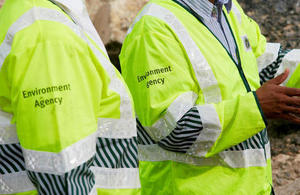Press release: Environment Agency issues Brockham oil site permits
The Environment Agency has issued new modern permits to Angus Energy plc for production at its Brockham site in Surrey.
The Environment Agency has issued new modern permits to Angus Energy plc for production at its Brockham site in Surrey.

The new permits bring the site into line with the current regulations for oil and gas sites to provide a high level of protection to the environment. This is part of the Environment Agency’s review of all oil and gas permits granted prior to October 2013.
The permits issued set out the stringent conditions that the site operator must comply with to ensure that the environment and local people are protected.
An Environment Agency spokesperson said:
Before we issue an environmental permit we need to be satisfied that the environmental risks associated with exploring for onshore oil and gas are managed and controlled through proper design and management of the drilling and exploration site.
As with all decisions on issuing environmental permits, we assess a company’s proposals to ensure they meet strict requirements. If an activity poses an unacceptable risk to the environment, the activity will not be permitted.
Further information on our decision and the permits can be found on GOV.UK.
Published 29 November 2018
Homes England has today published its latest official housing statistics, which show the number of homes being built in England continued to rise in the first half of this financial year.
Between 1 April and 30 September 2018, programmes managed by Homes England* started building 15,766 homes on site and completed a total of 15,704 homes. These figures represent 15 per cent and 31 per cent increases on the first half of 2017-18.
Affordable homes represented 63 percent of the housing starts (9,909 homes) – a 42 per cent increase on the same period last year – and 71 per cent of the housing completions (11,091 homes), a 19 per cent increase on the number of affordable homes completed in the first half of last year.
A total of 5,857 homes for market sale were started in the six months to 30 September 2018 – a 13 per cent decrease on the same time last year – however, the number of market sale homes completed in this period was up 69 per cent to 4,613, compared to 2,737 last year.
Of the affordable homes started, 5,714 were for Affordable Rent – a 26 per cent increase on the 4,526 started in the same period last year. A further 3,702 were for Intermediate Affordable Housing schemes (including Shared Ownership and Rent to Buy), representing a 71 per cent increase on the same period last year. The remaining 493 affordable homes started were for Social Rent, an increase of 68 per cent on the 294 started in the first six months of last year.
Of the affordable homes completed, 7,943 were for Affordable Rent – a 10 per cent increase on the 7,219 completed in the same period last year. A further 2,841 were for Intermediate Affordable Housing schemes – an increase of 50 per cent on the 1,900 completed in the same period last year. The remaining 307 affordable homes completed were for Social Rent, an increase of 76 per cent on the 174 completed in the first six months of last year.
Nick Walkley, Chief Executive of Homes England, said:
“These latest figures show the overall number of homes being built continues to rise, reflecting the hard work being carried out by the housing industry to build better homes faster.
“However, while they are encouraging to see, we cannot be complacent. We know there is more work to be done to meet the Government’s ambition to deliver 300,000 new homes a year, so we will continue to intervene in the housing market and use our land, powers and influence to make homes happen.”
ENDS
For further media information please contact:
Sarah Tucker, PR and Media Officer, Tel: 020 7393 2261 or 07970973134 Email: sarah.tucker@homesengland.gov.uk
Patsy Cusworth, PR and Media Manager, Tel: 020 7393 2201 or 0796772328 Email: patsy.cusworth@homesengland.gov.uk
*The figures published today reflect the latest set of official statistics in relation to housing starts and completions for England (excluding London for all programmes except those administered by Homes England on behalf of the Greater London Authority (GLA)). Since April 2012, the Mayor of London has had oversight of strategic housing, regeneration and economic development in London.
The list of programmes included in these totals are detailed in the official housing statistics report, which can be found here.
Homes England manages London delivery relating to Get Britain Building, Build to Rent, Builders Finance Fund and The Home Building Fund – Short Term Fund, which are reported in these statistics.
Homes England also manages the Help to Buy equity loan scheme in England (including in London on behalf of the GLA). However, the completions are reported by the Department for Communities and Local Government and, therefore, are excluded from these statistics.
Homes England is the Government’s housing accelerator. We have the appetite, influence, expertise and resources to drive positive market change.
By releasing more land to developers who want to make a difference, and investing in places of greatest need, to deliver new homes. Homes England welcomes partners who share their ambition to challenge the traditional norms and build better homes faster.
For more information click here or follow us on Twitter.
Nightclub boss banned for six years after failing to ensure the company kept proper accounting books and records.